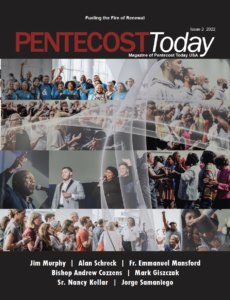Meditation and Questions for Reflection or Group Discussion
Mass Readings:
1st Reading: Isaiah 45:1, 4-6
Responsorial: Psalm 96:1, 3-5, 7-10
2nd Reading: 1 Thessalonians 1:1-5
Gospel: Matthew 22:15-21
Understanding What Belongs to God Versus What Belongs to Caesar
Repay to Caesar what belongs to Caesar and to God what belongs to God. (Matthew 22:21)
Do you see the trap these Pharisees were setting when they asked Jesus if it was lawful to pay the census tax to Caesar? If he had said that the tax was not lawful, he would have been branded as a revolutionary and a threat to the Romans. If he had said that the tax was lawful, he would have been branded as a collaborator with the oppressive imperial regime.
Jesus saw right through the trap (Matthew 22:18). Instead of falling for it, he gave them a simple yet profound answer—one that still asks us where we stand.
“What belongs to God” is all of his creation: the plants and animals of the earth, the stars of the sky, the sea and everything in it. And of course, his people—all of us. As the stars shine and the moon glows, as the birds sing and the trees bloom, they give glory to God. How much more should we, who are the crown of God’s creation, give him glory and honor? This is how we “repay to . . . God what belongs to God”—by worshipping him, by following his commandments, and by reaching out to care for his loved ones.
What about repaying to Caesar? Does it mean paying taxes so that police keep the peace, school buses run, and towns can care for the needy through social programs? Yes it does, and much more. That’s because the way we “repay to God” should affect the way we “repay to Caesar.” It should move us to find ways to care for the poor and homeless, to visit the sick and the elderly, and to lift up the lonely. It should move us to work toward transforming our towns and cities step-by-step. It should move us to take care of people, not just pay our taxes.
So what can you do for “Caesar” today?
“Here I am, Lord. Teach me how to change my corner of the world.”
Download this reflection with discussion questions here.(Many thanks to The Word Among Us for allowing us to use meditations from their monthly devotional magazine. Used with permission. For more information on how to subscribe to their devotional magazine, go to www.wau.org).
Sunday, October 22, 2017
Questions for Reflection and Discussion:
- The first reading today describes how God calls and anoints the pagan King Cyrus as a vehicle for protecting and caring for his people, Israel. In calling Cyrus, God says this of him: “For the sake of Jacob, my servant, of Israel, my chosen one, I have called you by your name, giving you a title, though you knew me not … It is I who arm you, though you know me not, so that toward the rising and the setting of the sun
people may know that there is none besides me. I am the LORD, there is no other.”
- Why do you think God would choose a pagan king as his chosen vessel to protect Israel (and eventually to allow the exiles to return to Jerusalem and rebuild the temple)?
- Why is it so easy to see ourselves, God’s people, as the only ones that God will bless and use?
- How open are you to working with anyone that God chooses to use to further his purposes, no matter where they are in their relationship with God?
- In the responsorial psalm, each of us is called to tell of God’s “glory among the nations; among all peoples, his wondrous deeds.” The psalmist goes on to give us some reasons why: “For great is the LORD and highly to be praised; awesome is he, beyond all gods. For all the gods of the nations are things of nought, but the LORD made the heavens.” The psalmist continues with these words: “give to the LORD glory and praise; give to the LORD the glory due his name!” and “Worship the LORD, in holy attire.”
- How would you describe why we as Christians should worship God and give him “glory and praise”?
- In what ways has God called each of us to “Tell his glory among the nations; among all peoples, his wondrous deeds”? Is there more you can do to tell others of God’s great love for them?
- In the second reading, St. Paul tells the Thessalonians that they are constantly in his prayers: “We give thanks to God always for all of you, remembering you in our prayers, unceasingly calling to mind your work of faith and labor of love and endurance in hope of our Lord Jesus Christ, before our God and Father, knowing, brothers and sisters loved by God, how you were chosen.”
- Paul says he prays “unceasingly” for the Thessalonians. How often do you pray for others, including those in the Church who labor in faith, hope, and love for God’s kingdom?
- What steps can you take to increase your prayers for your pastor and others serving the Church?
- What are some additional ways you can practically assist your pastor and parish?
- In the Gospel reading, the Pharisees and Herodians tried to test and “entrap” Jesus by posing to him this question: “Tell us, then, what is your opinion: Is it lawful to pay the census tax to Caesar or not?” Jesus’ initial reaction is quite revealing: “Why are you testing me, you hypocrites?”
- Why do you think Jesus called the Pharisees and Herodians, “hypocrites”?
- In what ways have you tested God with words such as: “If you really cared for me then …”; “If you will do this for me then…”?
- What can you do to make your relationship with God more of faith and trust and less of trying to use God for you own purposes?
- The meditation is a reflection on the Gospel reading, in particular, on Jesus’ response to the question posed to him: “repay to Caesar what belongs to Caesar and to God what belongs to God” (Matthew 22:21). The meditation also describes some of the specific ways we can do this.
- How would you describe the ways you can repay “to God what belongs to God” and “repay to Caesar what belongs to Caesar”?
- How are they related to or dependent on one another? How are they different?
- Take some time now to pray and ask Jesus to show you how he wants to use you to make a difference in the world, and for the grace and faith to do it. Use the prayer below from the end of the meditation as the starting point.
“Here I am, Lord. Teach me how to change my corner of the world.
[The discussion questions were created by Maurice Blumberg, who is in partner relations for The Word Among Us Partners, (http://www.waupartners.org/); a ministry of The Word Among Us (www.wau.org) to the military, prisoners, women with crisis pregnancies or who have had abortions, and college students. He is also a member of the National Service Committee Council of the Catholic Charismatic Renewal (https://www.nsc-chariscenter.org/) and a member of the board of directors of the Christlife Catholic Ministry for Evangelization (https://christlife.org/). Maurice was also the founding Executive Director of the National Fellowship of Catholic Men. He can be contacted at (Enable Javascript to see the email address) mblumberg@wau.org or mblumberg@aol.com.]


 Click Here for us to pray for your intentions through our new website.
Click Here for us to pray for your intentions through our new website. 
